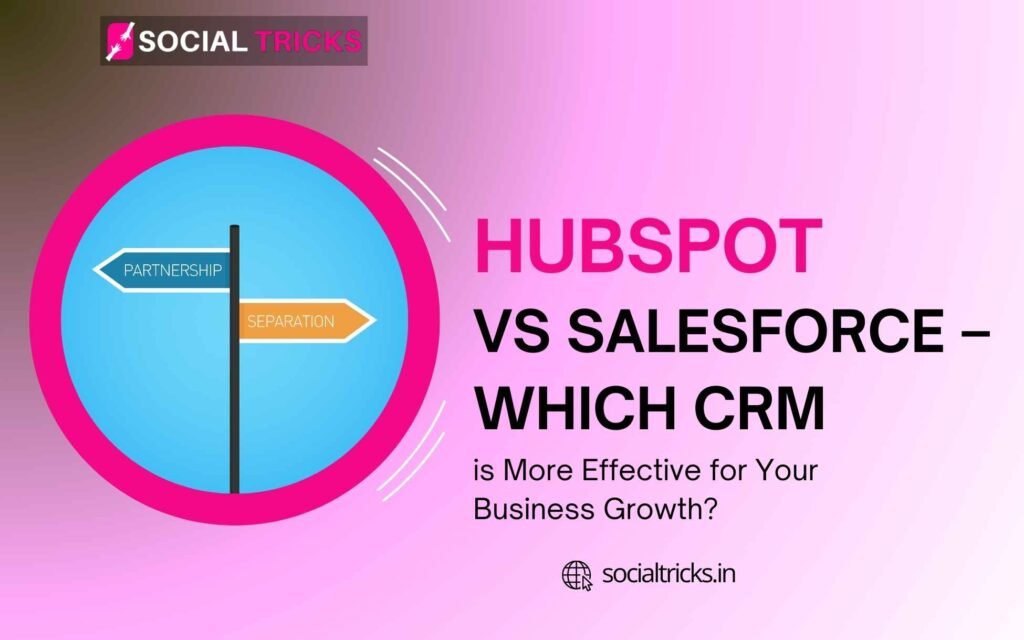Customer Relationship Management (CRM) can help businesses stack sales, marketing, and customer service. HubSpot and Salesforce are two of the most talked-about CRM software presently. Yet, which one has the potential for your growing business? Figure this out by way of a comprehensive comparison.
What is CRM and Why Is It Needed in Modern-Day Business?
A CRM (Customer Relationship Management) is software that helps businesses keep track of their customers’ data, manage leads, and customer consultation. It improves customer service, sales, and marketing services.
Advantages of Using a CRM:
- Organizes customer information
- Automates sales and marketing tasks
- Increases revenue through tracking sales pipeline
- Enhances customer experience
- Provides insights with analytics and reporting
HubSpot vs Salesforce: A Quick Comparison
| Features | HubSpot CRM | Salesforce CRM |
| Ease of Use | Beginner-friendly | Requires training |
| Pricing | Free plan, with affordable paid options | Higher pricing with advanced features |
| Customization | Not much in comparison to Salesforce | Customer can customizability to the boots. |
| Integration | Connects with many tools | Not as efficient |
| Customer Support | Free | Paid |
| Best for | Small to mid-size businesses | Large enterprises |
HubSpot CRM: Its Features, Benefits, and its Areas of Cons
HubSpot CRM is a beginner-friendly CRM designed for small to medium-size businesses. The system offers the free version with very powerful features.
Best Features Include:
✅ Free CRM with Unlimited Users ✅ Email Tracking & Automation ✅ Lead Management & Sales Pipeline ✅ Live Chat & Chatbots ✅ Reporting & Analytics ✅ Seamless Integration with HubSpot Marketing & Sales Hub
Pros:
✔ Intuitive interface ✔ Affordable pricing for starters (offers a free plan) ✔ Best for small businesses and start-ups ✔ The best part is the deep level of analytics and reporting.
Cons:
❌ The number of advanced features is not unlimited.
❌Lack of alternative customizations, in comparison to Salesforce.
❌The automation is low.
Salesforce CRM: Its Features, Benefits, and Areas of Cons
Salesforce is robust and very powerful and handles the largest clients with considerable customization and automation.
Key Features:
✅ Advanced Sales & Marketing Automation ✅ AI-Powered Insights with Einstein Analytics ✅ Highly Customizable Dashboards ✅ Enterprise-Grade Security & Compliance ✅ Integration with Thousands of Apps ✅ Comprehensive Customer Support
Pros:
✔ Highly customizable ✔ Scalable for large businesses ✔ AI-powered analytics and automation ✔ Strong third-party integrations
Cons:
❌ Expensive crazy pricing ❌ Steep learning curve ❌ You have to train and support this thing.
Pricing Comparison: Which Option Makes You Spend Less?
The three main factors that will determine your choice are cost, comparison, and CRM. So what are the options between HubSpot and Salesforce?
HubSpot Pricing
- 💰 Free CRM Plan: Basic features.
- 💰 Starter – $20/month
- 💰 Professional – $890/month
- 💰 Enterprise – $3,600/month
Salesforce Pricing
- 💰 Essentials – $25/user/month
- 💰 Professional – $80/user/month
- 💰 Enterprise – $165/user/month
- 💰 Unlimited – $330/user/month
👉 Small Business Winner: HubSpot (They offer everything as either free or affordable.)
👉 For Bigger Enterprises: Salesforce (Requires customization)
Ease of Use: HubSpot vs Salesforce
A CRM Stance Point needs a system that is hassle-free to use so the team members can be up and running in no time.
- HubSpot: Very intuitive, who needs no training with its simple drag-and-drop operations—a complete WYSIWYG as they call it.
- Salesforce: Could be quite complicated for users who are still getting the hang of it; only technical experts can really blow its customization trumpet.
The Verdict: For a Newbie, HubSpot is the Best; Senior Guys and Technologists, Technically and User-wise, Choose Salesforce.
Talk of Integration
Despite either of these containing third-party integrations, there are disparities to discuss.
- HubSpot: An integration for practically every advanced application such as Gmail, Slack, and Shopify.
- Salesforce: Delivers a whopping 4,000 and beyond integrations from third parties with rocksolid confidence.
Therefore, Salesforce integrates with more stuff often and better than HubSpot.
AI Support and Customer Gratification
- HubSpot: You get all types of technical support for free via chat, mail, or phone.
- Salesforce: Paid service and really high tariffs.
HubSpot is a Winner in the Support, for giving it for no cost.
Which CRM Software Is Most Appropriate for Yours?
Go with HubSpot if:
- You’re a small or medium business
- On a tight budget
- You are after marketing automation
Definitely consider Salesforce CRM if:
- You are medium to large-sized with deep control over the settings
- In need of pinpoint targeting
- Complex analytics from all angles
- Considerably large IT teams are dedicated to this platform
Conclusion: CRM for You
Both Salesforce and HubSpot are energetic CRMs, but they are designed for two different professional needs. If you are a starter, or you operate a small company, please choose HubSpot. As for enterprises, the advanced tools of Salesforce win over an unfrozen-size investment level.
The Verdict:
- HubSpot (Ideal for Small Businesses) ✅
- Salesforce (Completely Cut Out for Enterprises) ✅
Still feeling conflicted? Take advantage of HubSpot’s free plan or the Salesforce trial ted in your picture in full integration operations!


